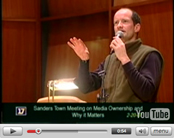Discuss E-List
Essential Resources Guide
FREE Teaching Resources
Membership Benefits
Partner Discounts
Summit 2006
FILM REVIEW: State of Play
Here's the trailer for "State of Play."
(Video disabled by request.)
First, a confession and a digression.
I confess that I hated the ending to this film, an utterly unsatisfying conclusion that gives the phrase “cop out” a new and pathetic yardstick. If I weren’t committed to nonviolent secession, I’d suggest that the scriptwriter be water boarded by the same U.S. government officials who seem to continually advocate the practice for the “evil doers” here in what we call “real life.”
That said (and I now digress), you know a new Hollywood movie exploring the unfolding train wreck that is 21st century U.S. mainstream journalism (against a backdrop of government and corporate corruption, no less!) may turn out to be reasonably engaging when said film’s opening sequence features a tune by Newfoundland party boy band “Great Big Sea” - and not just any tune, but their iconic “Paddy Murphy,” one of the best drinking songs ever penned and performed.
No surprise, perhaps, as GBS front man Alan Doyle and actor Russell Crowe are, in fact, drinking buddies. And Crowe is the front man in “State of Play,” acting as Cal McAffrey, a “Washington Globe” newsman as disheveled and unkempt as the 21st century news business itself. McAffrey represents Hollywood’s mythologizing of the prototypical “courageous and enterprising journalist” – think Woodward and Bernstein meet Edward R. Murrow without the tie and smokes. McAffrey seems principled, meticulous, and driven, working out of a tiny office cubicle surrounded by faded newspaper articles – code for the anachronistic print-driven media and a dying (so the pundits moan) 21th century industry. Oh, and he also has a sign on his desk that reads “Never trust an editor.”
McAffrey’s desperate publisher, Cameron Lynne, (a sneeringly capable Helen Mirren) has newspapers to peddle, and new headlines in the form of a breaking story involving the murder of senator’s “aide” Sonia Baker that may be the next salacious (and saleworthy) crisis de jour. Senator Stephen Collins (a wooden Ben Affleck) is the politician in question. Turns out, he’s an old friend of Crowe’s investigating the “Defense” Department’s outsourcing practices to private corporations doing business in Iraq and Afghanistan. (This would never happen in real life, of course.). The mysterious death of Collins’ assistant, and his very public emotional reaction to the news, raises immediate red flags for those paying close attention, including an enterprising young “Capital Hill” blogger named Della Frye (actress Rachel McAdams, and true to stereotypical form, she is young, perky and easily excited.) The crusty McAffrey does not think highly of Internet-driven journalism, we soon learn. “Was Collins sleeping with Baker?” Frye asks McAffrey early on in the investigation. “I’d have to read a couple of blogs before I form an opinion,” McAffrey snaps in response.
Collins, his staffers, and his estranged wife fire up damage control by making a public statement and engaging in desperate acts of P.R. (“padding, platitudes, and fluff,” McAffrey grumbles at one point). McAffrey, meanwhile, is on the case, doing what good investigative journalists are supposed to do: asking questions, following leads, making calls – “All the President’s Men” stuff. His conclusion? Corporate conspiracy. His skeptical publisher buys him some time – and suddenly McAffrey and Frye are working together on the murder. “This is a real story,” McAffrey says to her before they part ways. “It doesn’t require an opinion.”
Got it?
The film, directed by Kevin Macdonald, gives us plenty of twists and turns, just enough “through the newsroom looking glass” shots of suspense, and a much-needed “conflict of interest” critique involving war profiteering, mercenaries-for-hire, and private defense contractors, a story not enough real U.S. daily newspapers of record have found the time and wherewithal to cover. (A second digression - read independent journalist Jeremy Scahill’s book on “defense” contractor Blackwater-turned-Xe if you are looking for a primer.) “State of Play” also raises larger questions about the state of 21st century U.S. journalism’s ability to serve as a “watchdog,” given what is at stake.
And what is at stake?
In the film, our actors of conscience speak of $30-40 billion annually – the so-called “Muslim Terror Gold Rush” involving the for-profit privatization of Homeland Security in the name of prosecuting the
“war on terror” – the war, remember, that Mr. Cheney told us would not end in our lifetimes.
In real life?
Well, I guess we’ll have to wait for the New York Times to tell us, eh?
Or seek out the dozens of independent researchers (and yes, many of them are well-researched bloggers with, brace yourself: facts) who are already telling this story, the gist of which involves the life and death of the U.S. republic itself.
But sadly, this gets lost with the film’s surprise ending.
I left the theater with my head in my hands.



![View your cart items []](/sites/default/modules/ecommerce/cart/images/cart_empty.png)





